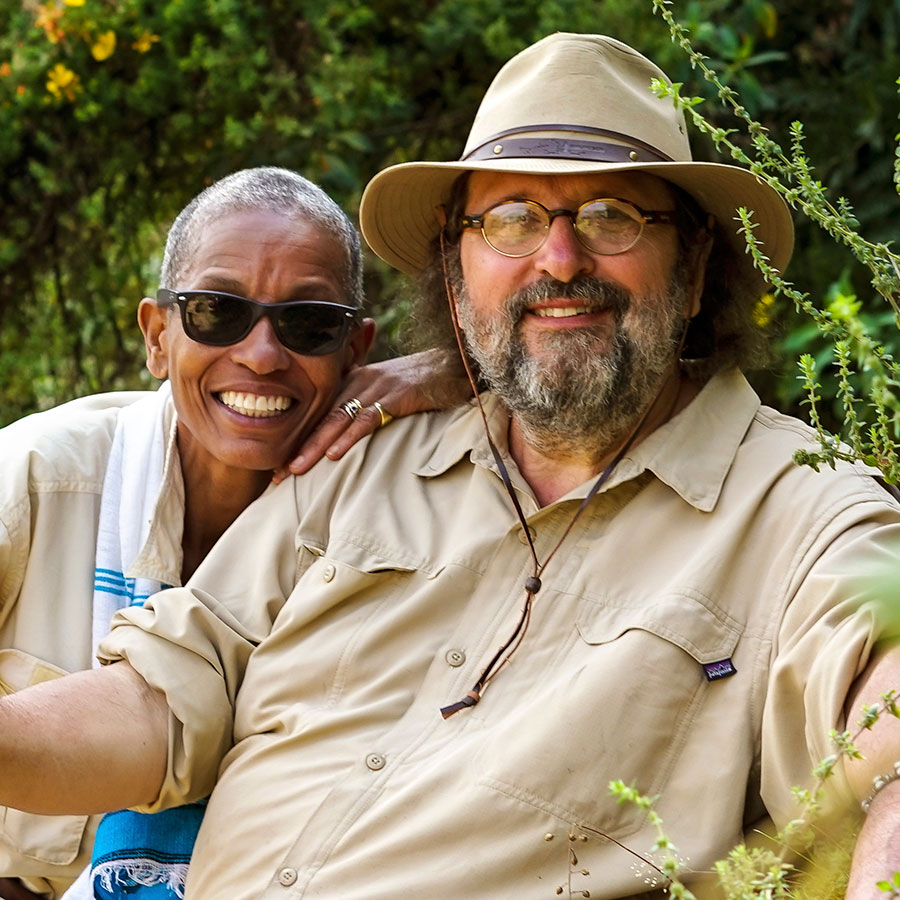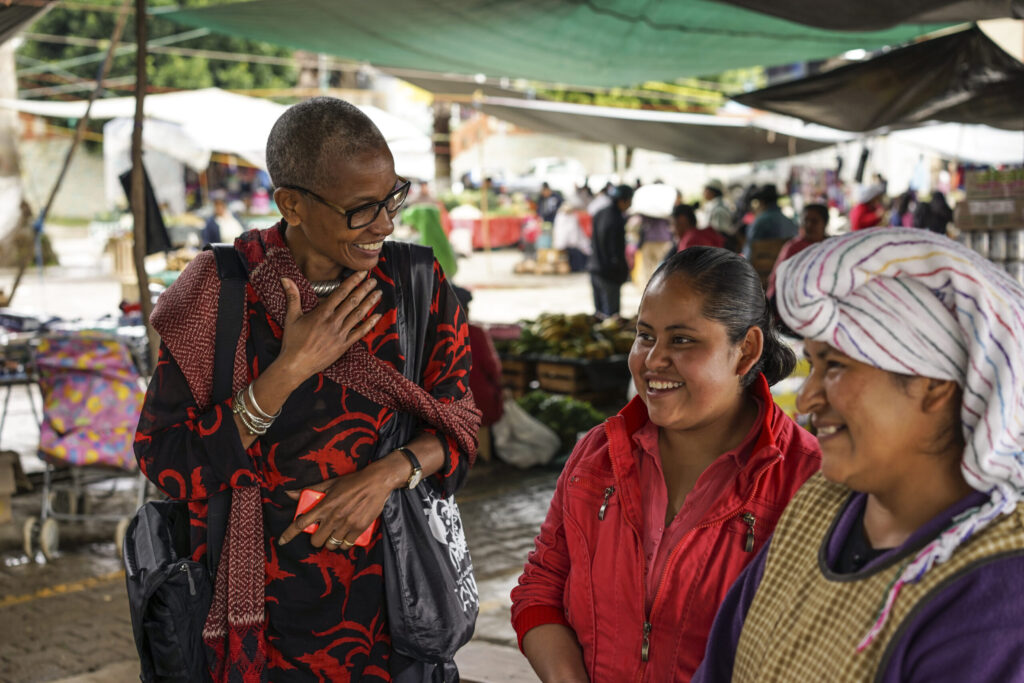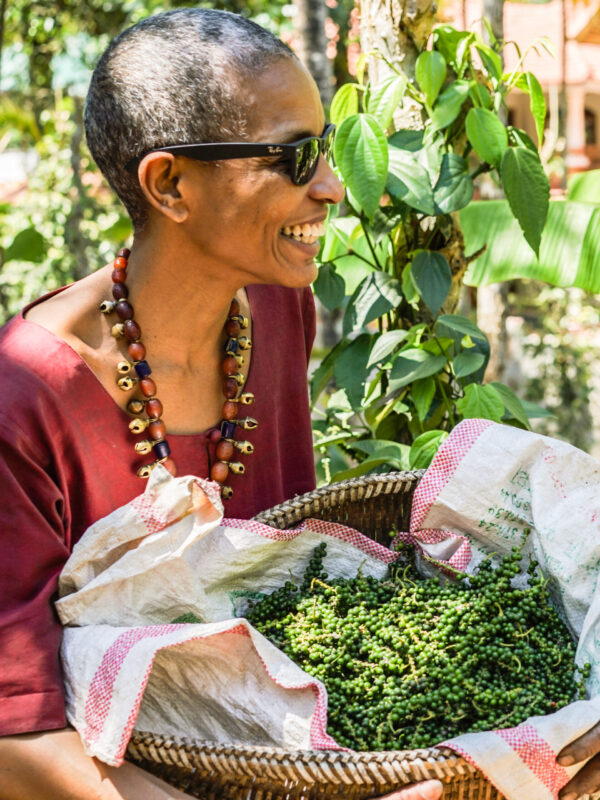When I walked into Épices de Cru, a spice store in Montreal’s Jean Talon Market, I felt like I was in a magical potion shop. It was whimsical and charming, clearly created by people who’d seen the world and wanted to bring the best of it to their customers.
Ethné and Phillipe de Vienne, former caterers who have been married for 41 years, own this shop together. Ethné, who is originally from Port of Spain in Trinidad, says she and her husband started Épices de Cru as a semi-retirement project. The couple traveled the world together, sharing meals in homes in places like Addis Ababa in Ethiopia and Kerala in Southern India. On their journeys, they discovered spices from the best terroirs in the world. Sharing an expansive mindset, the duo didn’t believe in restrictions or rules that often made a person’s culinary world smaller. So the goal of Épices de Cru was to take a worldly approach to their offerings. “Our dream was to have good spices from everywhere,” says Ethné. “We thought, ‘How could that be so hard?’.”
Laughing, she says they soon realized it was actually much harder than they imagined. But, “It’s good to be incredibly naive when you have somebody who loves you and you love them,” she adds. And, luckily, the two were up to the challenge.
It became clear that this world of spices was a true “metier,” a French word that translates into vocation or calling. “This is not something you do because you got some time on your hands or maybe because it’s February and it’s cold outside,” says Ethné. “This is about establishing relationships. We all know what that entails just in our professional and personal lives. Imagine when you’re doing it across borders and across continents and across language barriers.”

Forming global connections proved helpful in filling shelf space reflecting the world. Épices de Cru might be a small space, but I’d never seen such a stock of spices, herbs, chilis and peppers in one place: isot or Urfa Kurdish black pepper, multiple varieties of saffron and cardamom, a wild Ethiopian herd named koseret, and several unique blends—all presented in small metal cans or glass jars.
In addition to owning the shop, Ethné and Phillippe have also authored five books together. One of them, The Golden Rules of Spices, reads like an epic travel narrative (and a bit of a love story as well). Essays regale readers with tender stories, like when Ethné, Phillippe and their daughter Marika were invited to New Year’s dinner by the Li Family in Nu River Valley, who later became their suppliers for Chinese cardamom. Another essay tells the story of the Grenadian spice merchant named Lyris, whose nutmeg plantation was hit by Hurricane Ivan before Ethné and Phillipe gave her advice they’d learned from visiting nutmeg plantations in Indonesia. Lyris’ spices can be found in Épices de Cru’s West Indian blend, which includes West Indian bay leaf, allspice and cocoa beans.
The history of the spice trade is one rooted in exploitation and greed. Not just its past, Ethné points out, but also its present, as fraudulent practices and the disinvestment of local suppliers from the industry run rampant. That’s partially what makes The Golden Rules of Spices such a powerful book and Épices de Cru an impactful business. They are records of what it looks like to trade spices ethically, to use local suppliers, to engage with people and learn from them, not take credit. Ethné and Phillippe reject the bravado of many professionals in the culinary world and instead embrace a more collaborative vision, citing the people who have inspired them and giving a platform for their suppliers.
In this, Ethné says, there is an advantage to being a small, homegrown business in the neighborhood market. “We didn’t have millions tied up in this. We could afford our principles and our values, and thankfully we continue to do that. Because our values are more important to us than a couple extra zeros.”

The Golden Rules of Spices is also about the theory and science of spices, a woefully under-covered topic in culinary spaces, where Ethné points out that people often aren’t taught the difference between flavor and taste. The book explains it well. “The perception of flavor is triggered by the smells which reach our nasal cavity through the back of our palate when we eat. Our noses can differentiate well over 10,000 smells. Taste is the sensation experienced by our taste buds. Our tongues recognize at least six tastes, salt, sour, sweet, bitter, unami, and hot,” Ethné and Phillippe write. Each copy of the book comes with a kit of 26 spices and spice blends, which readers are then given instructions on how to use in an analytical way. They are also given recipes to spark creativity, like 8 Pepper Chocolate Cake, Yunnan Spices Yak Steak (if no yak is on hand, the De Viennes suggest deer, moose, or beef), Maryland Crab Cakes, and Fish Head Curry.
“Nobody has taken the time to break it down to give people the independence that is necessary and required to make these [flavor] decisions on your own,” says Ethné.
What drives Épices de Cru’s mission home is being located in Montreal’s Jean Talon Market, an ideal complement to the identity of the spice shop and books. The market boasts vendors who sell silky fresh oysters from Nova Scotia, quail eggs, local Quebec produce and wild mushrooms, and butchers that sell everything from duck to whole rabbits to horse meat. They even have deer you can use to substitute for the yak in the Yunnan Spiced Yak Steak. With this selection, one could then go into Épices de Cru and use it as the foundation that pulls all their unique findings together, like a culinary adventure.
Ethné says that their typical customer is someone who is not only open to that kind of adventure but also wants to learn from the merchants. “That is part and parcel of the identity of the market,” she says. “You don’t just go to [Jean Talon Market] to get your produce; you go there to live your life.”
Almost a century old, the Jean-Talon Market is one of the largest open-air markets in all of North America. Ethné is proud to be part of its history. “It is part of the DNA of this town,” she says. “And the people in the market and the people around the market have fought tooth and nail to keep it.”
She shares that while there are no chains allowed at the market, five years ago, a Starbucks opened up on Rue Jean Talon, which borders the market and could easily be mistaken for being part of the market itself. “A petition was launched before they had their keys finished and made through the front door,” says Ethné. “And it was vibrant, targeted and effective. A year later, they were gone. That was one of the proudest moments I think I’ve ever lived through.”







